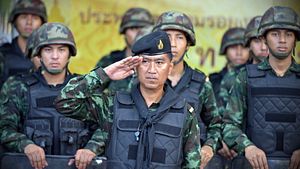In my previous post on the rule of Prayuth Chan-ocha, I noted that, in this “hard coup,” army rule could last a considerably long time–two years, and possibly even more. Some Thai observers are suggesting that Prayuth and the army will retain power for as much as five years. As I mentioned previously, in this “hard coup,” the military is likely to take more draconian action against any opponents in the next year as well, since the army has overseen somewhat of an economic rebound, has muffled most of the Thai press, and has gotten relatively little criticism from Asian countries like Japan, Indonesia and India. I expect to see activists detained for longer periods of time, and treated much more roughly under army detention than they have been so far. I also expect Thaksin sympathizers to be purged from the civil service and the armed forces, and many leading pro-Thaksin politicians to be charged with offenses and actually sent to jail, a rarity in the past for Thai elites of any political persuasion.
Given these grim possibilities, how should the United States respond? Thailand is of course a treaty ally and a longtime partner of the United States, as Thai diplomats are fond of reminding Americans. What’s more, despite the junta’s tough talk about the United States-Thailand relationship and Bangkok’s cozying up to China in recent months as a supposed counterweight to American influence in the kingdom, the Thai military, and Thai elites in general, very much still need American and European weaponry, training, and diplomatic ties. In addition, Thailand’s economy is so dependent on tourism and exports that it is, more than many other countries, naturally forced to be somewhat responsive to American, European, and Japanese policy toward the kingdom. It will be a long time before Chinese investment could replace Western and Japanese investment in terms of its overall impact on the Thai economy. Pavin Chachavalpongpun had an excellent op-ed on why Thailand still needs Western investment and acceptance, and why this situation gives Western democracies continuing influence over the kingdom.
Both the United States and the European Union have taken some measures in response to the coup, including suspending some military aid and, in the case of the European Union, halting progress on a planned free trade agreement with Thailand. But both Washington and Brussels continue to operate as if this coup were similar to previous Thai coups, just a bump in relations that will soon be overcome. Many American officials have quietly pressed for resuming Cobra Gold joint exercises with Thailand next year, for example, arguing that Thailand is a critical partner on everything from counterterrorism cooperation to narcotics interdiction to dealing with troublesome neighbors like Myanmar and Cambodia.
But this assumption, of a quick return to robust ties, is based on flawed thinking. Thailand will continue to remain highly unstable under prolonged junta rule, since the military cannot maintain power indefinitely. The large numbers of Thais who have repeatedly voted for pro-Thaksin parties will not be silenced forever. Instead of simply preparing to return to normal, the United States should be making plans to move operations in Thailand to other partners in the region and, overall, to become much less dependent on the kingdom, while reminding contacts in the Thai government and military that, if the kingdom returns to real democracy, the robust U.S.-Thai partnership of the past would resume in earnest.
Such moves could include shifting more of the FBI and narcotics interdiction programs in Thailand to Singapore, and moving Cobra Gold, for an extended period of time, to Singapore or the Philippines. The shifts also could include moving some aspects of the International Law Enforcement Academy in Bangkok to Singapore and other countries in the region, and eventually, if necessary, moving ILEA in its entirety. Along with moving ILEA, the United States government could shift some of the military officer training programs it runs in Thailand for soldiers from other Asian countries to Singapore, Malaysia, Australia, or other countries.
Joshua Kurlantzick is a fellow for Southeast Asia at the Council on Foreign Relations. This post appears courtesy of CFR.org and Forbes Asia.

































